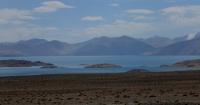Вы здесь
Karakul lake on Pamir.

Tours on lake Karakul in Tajikistan.
“Nature encourages no looseness, pardons no errors”
Ralph Waldo Emerson.
Tours and walks Tajikistan.
Tajikistan largest natural reservoir, Karakul Lake (Black lake), is located in the East Pamirs, about 3,900m above seal level. It covers about 380 km2 with a maximum depth of 238 m. It is 33 km long and 23 km wide.
A large island range stretches from the north to the south, dividing the lake into two parts: the shallow eastern side and the deep western side. In the late 19th century the northern part of the island was linked to the bank by a narrow isthmus.
The isthmus has now disappeared. The small Kara-Jilga, Karaart, and Muzgol rivers and several streams feed into Karakul -but none flow out; the bitter and salty lake does not drain anywhere.
The water in the small rivers' estuaries is reasonably fresh, and loaches can be found there. Settlements of brown-headed seagulls and Tibetan terns nest on the islands. The bank of the lake is typical of high-mountain desert, and only near the water's edge can one find sedge, Pamir buckwheat, and some saltvworts.
A curious feature of Karakul is that its banks rest on ice for a considerable length, and ice also covers the bottom of the lake. Scientists do not agree on the source of this ice. Some think that these are the remnants of ancient glaciers, and some explain it as the remains of an ice shield that filled the hollow during the ice age.
Others suppose that the ice is a modern formation. However it got there, the ice on the banks melts slowly, creating waterfalls, straits, tiny lakes, and small islands separated from the banks.
The lake itself constantly changes in size. The Karakul hollow is also remarkable in that it is the most desert-like place in the Pamirs, with the lowest level of precipitation - about 20 mm/year.
The water surface of the Karakul is not actually black (as it is named) but ultramarine, dark blue, or a greenish colour depending on way the sunlight hits the smooth transpar ent water. Karakul village is on the eastern bank of the lake near the road, and is mostly inhabited by Kyrgyz.
The famous Markansu valley is located few kilometres from the lake. Some people translate it as the "Valley of Sand storms", and others as "Death Valley". The most common translation is "Dead Water".
It is difficult to say with the people gave it that name. Perhaps it was because it was the first area seen by travellers coming to the Pamirs from the flourishing and fertile Alai valley, and th contrast between the two places was so marked.
The internationally-known Stone Age settlemei of Oshhona (VIII century. B.C.), which was a home for seasonal hunters, was discovered here. Near Karaa village, approximately 1 km from the Murghab - Osh higl way, at 3,950m, there is a Ist century architectural complex which combines an observatory with the cult of animals.
Karakul region has a severe climate but it is also beautiful. It is the primitive, untouched nature due to its relative inaccessibility that attracts tourists.
Authorship:
Javad Abed Khorasani. http://www.asraresokhan.com
Alexander Petrov
photos.







